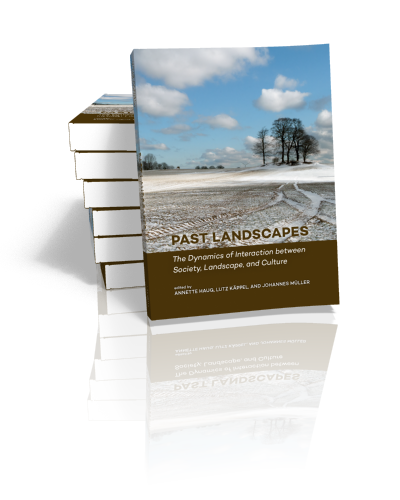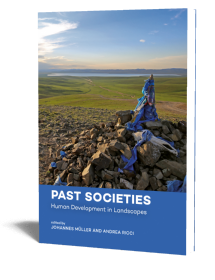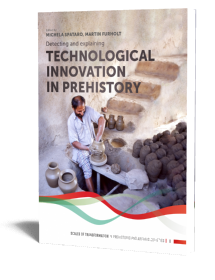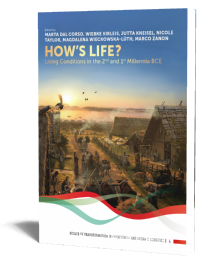Past Landscapes
The Dynamics of Interaction between Society, Landscape, and Culture
Edited by Annette Haug, Lutz Käppel & Johannes Müller | 2018

Past Landscapes
The Dynamics of Interaction between Society, Landscape, and Culture
Edited by Annette Haug, Lutz Käppel & Johannes Müller | 2018
Paperback ISBN: 9789088907319 | Hardback ISBN: 9789088907296 | Imprint: Sidestone Press | Format: 182x257mm | 350 pp. | Language: English | 23 illus. (bw) | 69 illus. (fc) | Keywords: landscape; society; culture; material culture; environment; interaction; archaeology; socio-environmental research | download cover | DOI: 10.59641/h7l684aj
Read online or downloaded 2152 times
-
Digital & Online access
This is a full Open Access publication, click below to buy in print, browse, or download for free.
-
Buy via Sidestone (EU & UK)
-
Buy via our Distributors (WORLD)
For non-EU or UK destinations you can buy our books via our international distributors. Although prices may vary this will ensure speedy delivery and reduction in shipping costs or import tax. But you can also order with us directly via the module above.
UK international distributor
USA international distributor
-
Bookinfo
Paperback ISBN: 9789088907319 | Hardback ISBN: 9789088907296 | Imprint: Sidestone Press | Format: 182x257mm | 350 pp. | Language: English | 23 illus. (bw) | 69 illus. (fc) | Keywords: landscape; society; culture; material culture; environment; interaction; archaeology; socio-environmental research | download cover | DOI: 10.59641/h7l684aj
Read online or downloaded 2152 times

We will plant a tree for each order containing a paperback or hardback book via OneTreePlanted.org.
Past Landscapes presents theoretical and practical attempts of scholars and scientists, who were and are active within the Kiel Graduate School “Human Development in Landscapes” (GSHDL), in order to disentangle a wide scope of research efforts on past landscapes. Landscapes are understood as products of human-environmental interaction. At the same time, they are arenas, in which societal and cultural activities as well as receptions of environments and human developments take place. Thus, environmental processes are interwoven into human constraints and advances.
This book presents theories, concepts, approaches and case studies dealing with human development in landscapes. On the one hand, it becomes evident that only an interdisciplinary approach can cover the manifold aspects of the topic. On the other hand, this also implies that the very different approaches cannot be reduced to a simplistic uniform definition of landscape. This shortcoming proves nevertheless to be an important strength. The umbrella term ‘landscape’ proves to be highly stimulating for a large variety of different approaches.
The first part of our book deals with a number of theories and concepts, the second part is concerned with approaches to landscapes, whereas the third part introduces case studies for human development in landscapes. As intended by the GSHDL, the reader might follow our approach to delve into the multi-faceted theories, concepts and practices on past landscapes: from events, processes and structures in environmental and produced spaces to theories, concepts and practices concerning past societies.
Preface
Past Landscapes: The Dynamics of Interaction between Society, Environment, and Culture
Annette Haug, Lutz Käppel, and Johannes Müller
Introduction
From Theories, Concepts and Practices on Human Development in Landscapes
Annette Haug and Johannes Müller
Landscape and the GSHDL 2007–2017: Ten Years of Research
Johannes Müller
I: Past Landscapes – Theories and Concepts
The Disentanglement of Landscapes: Remarks on Concepts of Socio-Environmental Research and Landscape Archaeology
Johannes Müller
On Melting Grounds: Theories of the Landscape
Antonia Davidovic
Ritual and Landscape: Theoretical Considerations
V.P.J. Arponen and Artur Ribeiro
II: Past Landscapes – Concepts and Practices
Putting Things into Practice: Pragmatic Theory and the Exploration of Monumental Landscapes
Martin Furholt, Martin Hinz and Doris Mischka
Who Is In Charge Here? – Material Culture, Landscapes and Symmetry
Christian Horn and Gustav Wollentz
Urban Landscapes and Urban Networks – Some Thoughts on the Process of Writing within the Mediaeval Urbanization of Central Europe
Gerhard Fouquet and Gabriel Zeilinger
Visual Concepts of Human Surroundings: The Case of the Early Greek Polis (10th–7th century BC)
Annette Haug
The Cultural Significance of Plants
Wiebke Kirleis
III: Past Landscapes – Concepts, Space and History
Mid-Holocene Environment and Human Interaction in Northern Central Europe
Mara Weinelt
From Hunting to Herding? Aspects of the Social and Animal Landscape during the Southern Scandinavian Neolithic
Martin Hinz
Borders: Developments of Society and Landscape during the Bronze Age and the Iron Age – Face Urns as a Case Study
Jutta Kneisel
The Iron Age in Southwestern Germany
Oliver Nakoinz
The ‘Iranian’ Period in the Near East: A Landscape Studies Approach
Josef Wiesehöfer
The Bronze Age in the East – The Hittites and Their Environment
Walter Dörfler
Nature and Perception of a Greek Landscape: Stymphalos
Ingmar Unkel
Scenes and Actors of Historical Crises between Generalizing Synthesis Formation and Postmodern Fragmentation
Ulrich Müller and Donat Wehner

Prof. dr. Annette Haug
Institute of Classical Studies / Classical Archaeology, CAU Kiel (present). Studies of Classical Archaeology, Art History and Prehistory in Heidelberg and Paris, binational PhD 2003, Habilitation Leipzig 2009, LMU München Heisenberg Fellow. Since 2012, Professor of Classical Archaeology at the Christian-Albrechts-Universität zu Kiel. PI of the ERC Consolidator Grant “Decorative Principles in Late Republican and Early Imperial Italy” 2016-2022. Former co-speaker and actual PI of the Cluster of Excellence ROOTS.

Prof. dr. Lutz Käppel
Studies of Classics in Tübingen and Oxford, PhD 1990, Habilitation 1997, Professor of Classics, especially Greek Literature at the Christian-Albrechts-Universität zu Kiel 1999-, Ordinary Member of the German Archaeological Institute 2000-, Dean of the Faculty of Humanities 2006-2008, Co-Coordinator of the Kiel Graduate School ‘Human Development in Landscapes’ 2007-2016; Speaker of the University’s Research Focus ‘Social, Environmental, Cultural Change’ 2007–.

Prof. dr. Johannes Müller
Johannes Müller (PhD, University of Freiburg, 1990) is a Professor and Director of the Institute for Prehistoric and Protohistoric Archaeology at Kiel University, Germany. He is the founding director of the Johanna Mestorf Academy, Speaker of the Collaborative Research Centre “Scales of Transformation: Human-environmental Interaction in Prehistoric and Archaic Societies”and of the Excellence Cluster “ROOTS – Social, Environmental, and Cultural Connectivity in Past Societies”.
Abstract:
Past Landscapes presents theoretical and practical attempts of scholars and scientists, who were and are active within the Kiel Graduate School “Human Development in Landscapes” (GSHDL), in order to disentangle a wide scope of research efforts on past landscapes. Landscapes are understood as products of human-environmental interaction. At the same time, they are arenas, in which societal and cultural activities as well as receptions of environments and human developments take place. Thus, environmental processes are interwoven into human constraints and advances.
This book presents theories, concepts, approaches and case studies dealing with human development in landscapes. On the one hand, it becomes evident that only an interdisciplinary approach can cover the manifold aspects of the topic. On the other hand, this also implies that the very different approaches cannot be reduced to a simplistic uniform definition of landscape. This shortcoming proves nevertheless to be an important strength. The umbrella term ‘landscape’ proves to be highly stimulating for a large variety of different approaches.
The first part of our book deals with a number of theories and concepts, the second part is concerned with approaches to landscapes, whereas the third part introduces case studies for human development in landscapes. As intended by the GSHDL, the reader might follow our approach to delve into the multi-faceted theories, concepts and practices on past landscapes: from events, processes and structures in environmental and produced spaces to theories, concepts and practices concerning past societies.
Contents
Preface
Past Landscapes: The Dynamics of Interaction between Society, Environment, and Culture
Annette Haug, Lutz Käppel, and Johannes Müller
Introduction
From Theories, Concepts and Practices on Human Development in Landscapes
Annette Haug and Johannes Müller
Landscape and the GSHDL 2007–2017: Ten Years of Research
Johannes Müller
I: Past Landscapes – Theories and Concepts
The Disentanglement of Landscapes: Remarks on Concepts of Socio-Environmental Research and Landscape Archaeology
Johannes Müller
On Melting Grounds: Theories of the Landscape
Antonia Davidovic
Ritual and Landscape: Theoretical Considerations
V.P.J. Arponen and Artur Ribeiro
II: Past Landscapes – Concepts and Practices
Putting Things into Practice: Pragmatic Theory and the Exploration of Monumental Landscapes
Martin Furholt, Martin Hinz and Doris Mischka
Who Is In Charge Here? – Material Culture, Landscapes and Symmetry
Christian Horn and Gustav Wollentz
Urban Landscapes and Urban Networks – Some Thoughts on the Process of Writing within the Mediaeval Urbanization of Central Europe
Gerhard Fouquet and Gabriel Zeilinger
Visual Concepts of Human Surroundings: The Case of the Early Greek Polis (10th–7th century BC)
Annette Haug
The Cultural Significance of Plants
Wiebke Kirleis
III: Past Landscapes – Concepts, Space and History
Mid-Holocene Environment and Human Interaction in Northern Central Europe
Mara Weinelt
From Hunting to Herding? Aspects of the Social and Animal Landscape during the Southern Scandinavian Neolithic
Martin Hinz
Borders: Developments of Society and Landscape during the Bronze Age and the Iron Age – Face Urns as a Case Study
Jutta Kneisel
The Iron Age in Southwestern Germany
Oliver Nakoinz
The ‘Iranian’ Period in the Near East: A Landscape Studies Approach
Josef Wiesehöfer
The Bronze Age in the East – The Hittites and Their Environment
Walter Dörfler
Nature and Perception of a Greek Landscape: Stymphalos
Ingmar Unkel
Scenes and Actors of Historical Crises between Generalizing Synthesis Formation and Postmodern Fragmentation
Ulrich Müller and Donat Wehner

Prof. dr. Annette Haug
Institute of Classical Studies / Classical Archaeology, CAU Kiel (present). Studies of Classical Archaeology, Art History and Prehistory in Heidelberg and Paris, binational PhD 2003, Habilitation Leipzig 2009, LMU München Heisenberg Fellow. Since 2012, Professor of Classical Archaeology at the Christian-Albrechts-Universität zu Kiel. PI of the ERC Consolidator Grant “Decorative Principles in Late Republican and Early Imperial Italy” 2016-2022. Former co-speaker and actual PI of the Cluster of Excellence ROOTS.

Prof. dr. Lutz Käppel
Studies of Classics in Tübingen and Oxford, PhD 1990, Habilitation 1997, Professor of Classics, especially Greek Literature at the Christian-Albrechts-Universität zu Kiel 1999-, Ordinary Member of the German Archaeological Institute 2000-, Dean of the Faculty of Humanities 2006-2008, Co-Coordinator of the Kiel Graduate School ‘Human Development in Landscapes’ 2007-2016; Speaker of the University’s Research Focus ‘Social, Environmental, Cultural Change’ 2007–.

Prof. dr. Johannes Müller
Johannes Müller (PhD, University of Freiburg, 1990) is a Professor and Director of the Institute for Prehistoric and Protohistoric Archaeology at Kiel University, Germany. He is the founding director of the Johanna Mestorf Academy, Speaker of the Collaborative Research Centre “Scales of Transformation: Human-environmental Interaction in Prehistoric and Archaic Societies”and of the Excellence Cluster “ROOTS – Social, Environmental, and Cultural Connectivity in Past Societies”.
-
Digital & Online access
This is a full Open Access publication, click below to buy in print, browse, or download for free.
-
Buy via Sidestone (EU & UK)
-
Buy via our Distributors (WORLD)
For non-EU or UK destinations you can buy our books via our international distributors. Although prices may vary this will ensure speedy delivery and reduction in shipping costs or import tax. But you can also order with us directly via the module above.
UK international distributor
USA international distributor
- Browse all books by subject
-
Search all books

We will plant a tree for each order containing a paperback or hardback book via OneTreePlanted.org.
You might also like:
© 2025 Sidestone Press KvK nr. 28114891 Privacy policy Sidestone Newsletter Terms and Conditions (Dutch)








